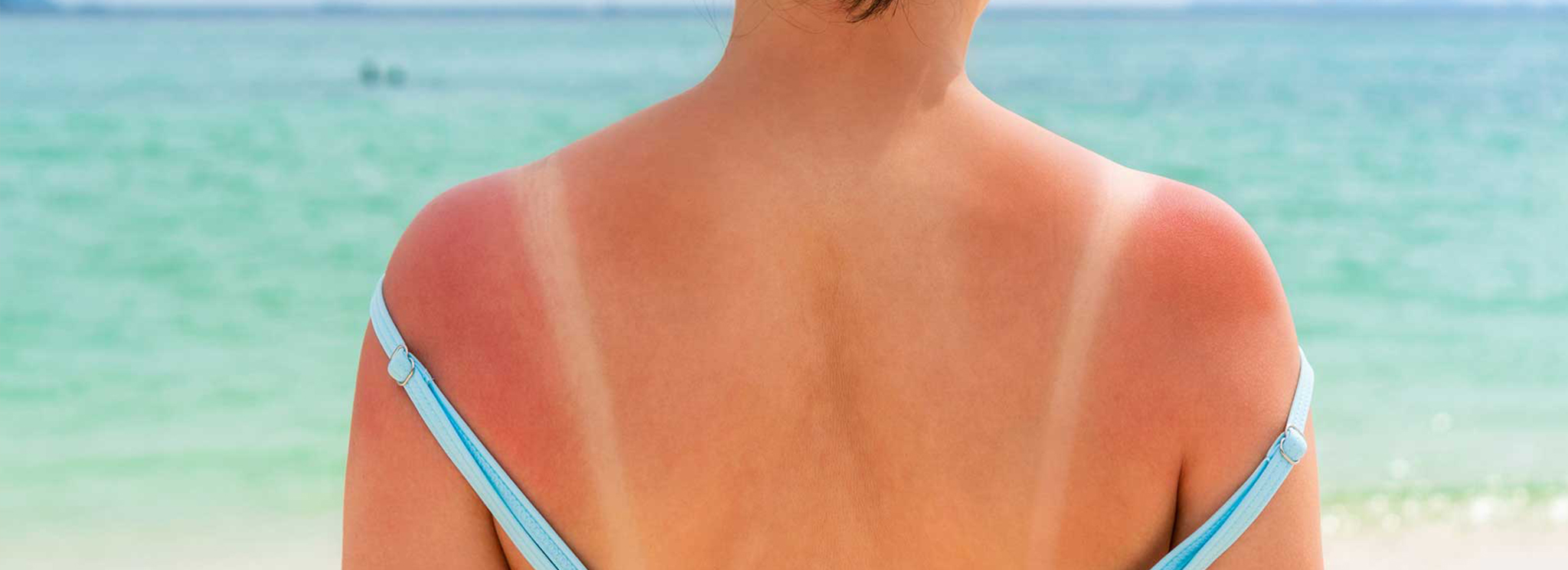
Sunburn Treatment and Prevention Facts
That time of the year again! The Summer season, is the time of sun, heat, and fun. As fun as the Summer season may be, too much sun is never a good thing.
Here we explain the common Summer ailment of sunburn. What it is, how to prevent it, and treatments.
What Are The Signs of a Sunburn?
The skin is red and there’s pain in the area of the burn.
When the sun shines on your skin for a period, it eventually burns, turning red and irritated. Under the skin, things get a little more complicated.
The sun gives off three wavelengths of ultraviolet light: UVA, UVB, UVC.
UVC light doesn’t reach the Earth’s surface. The other two types of ultraviolet (UV) light not only reach your beach towel, but they penetrate your skin.
Both UVA and UVB rays cause skin damage. Sunburn is the most obvious sign that you’ve been sitting outside for too long. But sun damage isn’t always visible.
Under the surface, ultraviolet light can alter your DNA, prematurely aging your skin. Over time, DNA damage can increase the risk of skin cancers.
How Soon Until a Sunburn Begins?
- Your skin type
- The sun’s intensity
- How long are you exposed to the sun?
- Did you wear sunscreen or protect your skin
Always remember, if a sunburn is severe, seek medical attention quickly! However, if you have caught too much sun, below are some ways to help treat the skin.
Sunburn Treatments:
- The first priority is to cool the affected area and stay out of the sun. Standing under a cool shower for 10 minutes will provide pain relief and prevent the sunburn from getting any worse.
- Dab cooled chamomile tea gently on affected areas.
- Apply the gel from the inside leaves of the aloe vera plant for a cooling and regenerative effect.
- You can apply lavender oil directly to the skin to heal sunburn.
- Make sure you drink two liters of water daily. More if it is hotter than usual or if you are recovering from sunburn or sunstroke. This will also prevent dehydration.
- Homeopathics are extremely useful for sunburn and most pharmacies carry them. The number one remedy for sunburn is arnica. You can take this both internally and apply it externally to the burn for additional support.
- Limit further exposure to the sun. The skin requires time to heal and regenerate. Use sunscreen daily.
- The use of sunburn relief sprays, gels, and over-the-counter remedies are great to soothe your skin until it has healed.
- You can take acetaminophen or other pain relievers to ease the burn from the sunburn temporarily.
- Use cold compresses and cool baths or showers to relieve the pain from a sunburn.
- Using moisturizers such as coconut oil and medicated creams can help with sunburn healing and peeling skin.
How Long Does a Sunburn Last?
The duration of a sunburn can vary depending on the severity of the burn. Typically, a mild sunburn can last for about 3 to 5 days. However, more severe sunburns can occupy up to a week or more to heal completely. It’s important to take proper care of the affected area and follow sunburn treatment recommendations to promote healing and alleviate discomfort.
Why Are You Itchy From a Sunburn?
When sunburned, your body triggers an inflammatory response to repair the damage caused by the sun’s UV rays. This response can lead to itching because of the release of certain chemicals in the skin. Additionally, as the skin is healing, nerve endings may be more sensitive, causing further itching. Avoid scratching the sunburned area is essential to prevent further irritation and potential infection.
Why Can You Prevent a Sunburn?
Preventing a sunburn from happening is extremely important. There are a lot of things you can do to avoid getting that uncomfortable burn.
- Use sunscreen with a high SPF (30 or more) and reapply it every two hours, especially after swimming or sweating. A sunscreen that is water resistant is best.
- Seek shade, especially during the peak hours of 10 a.m. to 4 p.m. when the sun’s rays are the strongest.
- Wear protective clothing, such as a wide-brimmed hat and sunglasses.
- Avoid tanning beds and sunlamps.
- Stay hydrated by drinking plenty of water.
When to Seek Medical Care for a Sunburn?
Seek medical care for a sunburn if you experience the following:
- Severe pain
- Blisters
- Fever and chills
- Nausea
- Dizziness
- Dehydration
Signs of infection, such as increasing redness, pain, pus, warmth, or swelling in the affected area
If you have any of these symptoms, it’s important to seek medical attention promptly. Additionally, if you have a severe sunburn covering a large area of your body, especially if it’s accompanied by symptoms like fever, headache, confusion, and feeling faint, seek immediate medical care.

